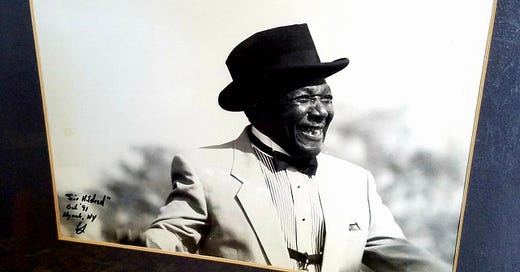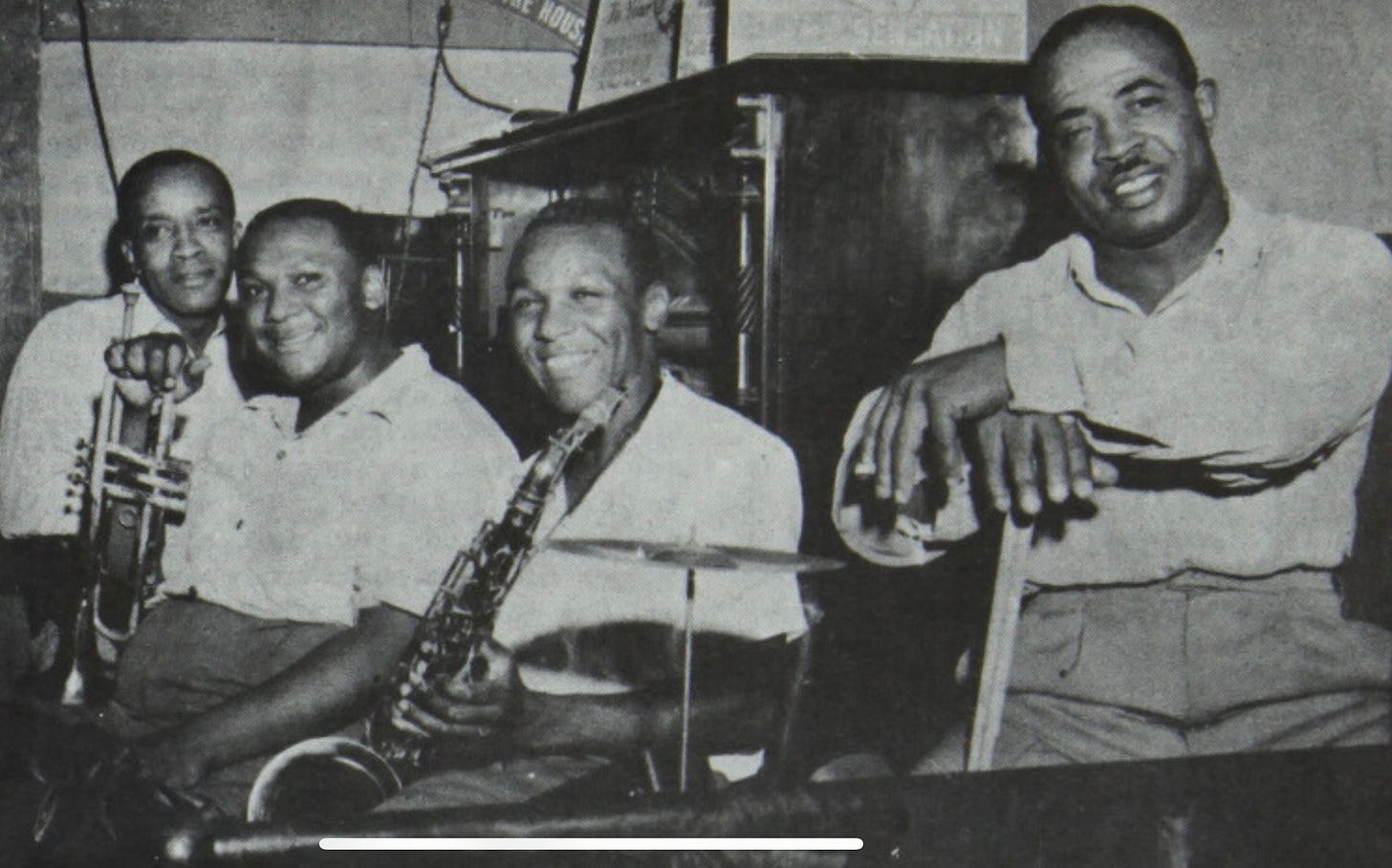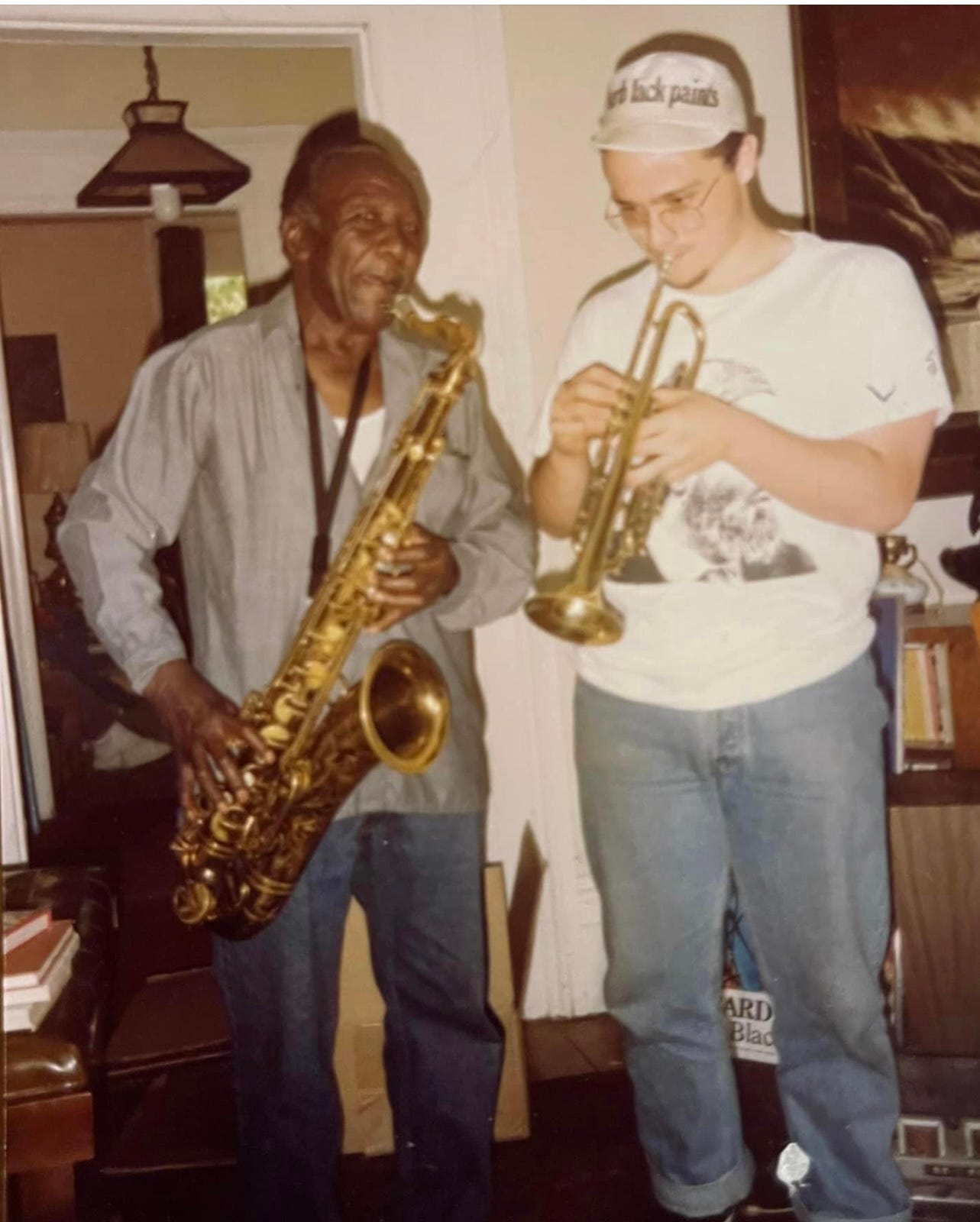Thoughts and Memories of Hildred Humphries with Erik Lawrence and Matt Lavelle
"Don't Hurt Nobody!"
For the next chapter here at No Sound Left Behind, I’m joined by saxophonist, flutist, multi-media artist, poet, storyteller, and sound healer Erik Lawrence. Erik and I are forever bonded by our having the great Sir Hildred Humphries as our mentor. Hildred was Erik’s before me. We have both written pieces about Hildred here in celebration of his on-going legacy. A word about Erik, his father Arnie Lawrence was the first live jazz that I ever saw and heard. Arnie sent me to trumpet boot-camp with Valery Ponomarev after he heard me at Smalls in the early 90’s. Before that I’ll never forget being in my high school jazz band that was going to Russia, and we were doing a benefit of some kind, playing on the street in Nyack, NY. We were pretty sad without charts. Erik came by and saved us. He gathered us into a group and then taught us Creole Love Call, and made sure we got the vibe. My first memory of Erik Lawrence is teaching me the first blues that I ever learned. Another memory I have with Erik is going to a set at a hall down by the river in Nyack. It was Hildred and Erik on tenors. At one point they did this thing where they circled the room together wailing on a tune. The audience was super-charged, and so was I.
Here’s Erik on Hildred..
In January of 1993, I stopped down to pick up Hildred Humphries in our home town of Nyack. Hildred had insisted that he would join me at the fabled Cathedral of St John The Divine in NYC for the memorial service of the great jazz trumpeter, Dizzy Gillespie. “I knew him when he first got to town.” Hildred said.
Born in 1910, making him seven years older than Diz, he was part of several legacies that were shared between the two and, lucky for me, shared by me as well. Hildred’s brother was a brash trumpet man, from their home town of Pittsburgh, as was early days other trumpet partner, Roy Eldridge. Frank was between Satchmo and Diz in the timeline, without the harmonic structures of Diz, but that fire and range. Imagine a mid 20’s Pittsburgh with Roy and Fatman blasting their trumpets around!
That Pittsburgh scene was popping! He played in a youth band with Art Blakey, Billy Strayhorn, Marylou Williams, Erroll Garner, Billy Eckstine, Nat Cole (Humph’s vocal idol). People could PLAY!
Roy and Hildred joined singer Ina May Hutton on his way to Kansas City. There’s no recordings of that band but their young pianist Bill Basie, in tow from Red Bank, New Jersey was about to make history in Kansas City. Hildred suggested on several occasions that the nickname “Count” was short for “No Count” (there’s an old song by that name) which was slang for “unaccountable”.
For whatever reason, Hildred didn’t stay on that path of meeting the Blue Devils in K.C. but met up with them all in New York City soon after. Hildred and Frank held court at a club in the center of Bleeker Street for thirteen years. At some point Hildred dropped off the scene but kept playing on the side, like he was when I first heard him, through the floorboards of my first serious girlfriend’s apartment when I was 19. That was 1980.
He was driving a big long American car back then, always dressed sharp, and either he or I would be out sitting in with the other for years in the Nyack area.
“Watch Out!” he’d say, as he was walking on stage to take his horn out of his case.
“Don’t hurt nobody!” he’d yell out if you started to get hot during your solo!
For years I would stop at his house along the Hudson at the end of DePew Ave in Nyack. We’d see his sister, nieces and nephews. We’d sit on the porch overlooking the water and he would show me old songs, how to “Make Changes” (hear what was essential about the song, melody and framework), and be able to play the song, even as you were improvising. With our two tenors we would take turns being the bass players for the other, and I would try to copy the elegant way that he would weave melodies around the virtues of the song. I still try to do that! It was more grounding and made more sense than the modern players I was trying to copy up to that point. After working with Hildred you had this sense, I trust my ears. My music is going to flow!
I know I wasn’t the only one he shared this kindness with. Regardless of the background or natural tendencies of the player, Hildred had the innate gift of hearing who that player truly was and helped them to bring it out. For many who had been ostracized for not adhering to the rigors of the modern jazz peers, or never feeling they belonged. He gave them the gift of finding out their home was deep inside of themselves. This ability always reminded me of Duke Ellington, especially in the early days, when he had specialists who could only do only one or two things well, a growly muted sound or a sweet melodic style. Even though Duke was supposed to have the greatest band in the world, they weren’t all expected to be virtuosic performers, just themselves… in fact that is why it was the greatest band in the world. Duke would write for them and their gifts. That’s why he didn’t write “tenor 2” or “trombone 3”. He would write the name of the cat who would be playing what he wrote just for them! Hildred made us all feel like we just had to learn who we were to be ready to go out there with our horn.
Dizzy’s funeral was a special moment for him, because he had been off the scene for decades. I knew who a lot people were because my father, Arnie Lawrence, was a great saxophonist as well, who had played with Dizzy and Clark Terry. So when we walked into that amazing church and people started running up to Hildred to ask how he was, where you been?, so good to see you… it meant a lot to him to be recognized from his early days on Bleeker Street meeting those guys when they were first showing up to town. I always felt it meant something to him that I was there as a witness, knowing who folks like Haywood Henry were, and how validating it was for them to recognize him. Of course he was dressed fine, with a beautiful fedora he made himself (I tried to look good too but never as good as Humph!).
In the last years of his life, which was when I knew Hildred, he played with a lot of local folks, none to his true caliber, and often not really jazz, even. He always made things better for people around him on stage and off. Seeing him shine in the light of his true peers that one day, and be filled with pride, even without the necessity of playing a note, will be something I carry with me, never finding a chance to share, but part of my sense of what is truly valuable in this life, a jazz man through and through!
Approaching Hildred’s 80th birthday celebration I brought him to NYC’s WKCR radio station one Sunday for him to be interviewed by the great jazz historian, Phil Schaap. Phil was quite excited because Roy Eldridge was his all time favorite trumpet player and Hildred was there with him in the beginning. Phil was sly and over the course of three hours asked Hildred many questions, trying to prove personal theories he had devised about those early years. He tried everything he could to get Hildred to change his story to fit his own narrative. But Hildred was solid. He hadn’t spent years drinking or messing around, clouding his memory. At one point he got tired of the cross interrogation, “You’ve asked me that question five different ways already. The answer is still the same!” Then he went back to being cordial and answering questions about the early days.
It was an amazing blessing in my life to have Hildred Humphries as a friend and mentor for so long. He truly helped shape the man, and the music that I am today.
Thank you Erik, and now my remembrance of Humph..
In 1989 I somehow found myself on stage with singer Frankie Dee at the Hudson House on Main St. in Nyack, NY. We were up on the second floor. My first mentor Hildred Humphries, a great sax man and singer, told me to meet him there so we could back up Frankie, a great singer then and now. Frankie’s voice is a lower, stretched out vibe like Johnny Hartman in a way, but the sound is more personal and distinct. He’s the light in the dark. Hildred had set it up so that there would be lots of blowing, and also asked Erik Lawrence to play. Summertime was called, and Erik took a scorching alto solo. Very strong with a big sound, and way up high with a very vocalized sound. My turn came up and Hildred was sitting in the audience, close to the front taking it all in. I started playing but kind of blacked out and started searching for something beyond what I knew I could play. I knew chords but never heard of voice-leading. I was 19 and there was something that I just had to say. On the 5th measure I took a totally off the rails risk and just slammed the horn down to it’s lowest note, F#. Possessed by myself perhaps, it’s possible my soul took over my body as I then squeezed out a half-valve slur that was as blue and vocal as can be. It was Rex Stewart’s technique, but this wasn’t Rex, it was me. As soon as I finished the phrase Hildred shouted out loud enough for the whole venue to hear “YEAH!”
Somehow at this early stage the core of my musical identity came rushing forth. I believe this was only made possible by way of Hildred’s cultivation and support. Who was Hildred Humprhies folks may ask?
Hildred was bona fide Swing Era. He was Jazz. In his heyday he was with Count Basie, Roy Eldridge, and Lady Day herself, Billie Holiday. Hildred went on the road with her for 6 months. He told me he was warned that she would be trouble, but that nothing could be further from the truth and that it was a wonderful experience.
Hildred and I were quite a pair. He had 60 plus years on me, but treated me like a little brother, but more like a buddy. We were introduced by legendary Nyack educator Bert Hughes, may he now rest in musical peace. I started visiting him at his house down by the riverside on DePew Ave. (The same house in Erik’s recollection) He was so inviting and generous. He told me right away about his late brother, the great Frank Humphries and how they were musical partners for most of his life. Hildred distinctly remembered young Miles Davis in the audience studying Frank. I found a CD of Frank performing After You’re Gone (see below) and when I played it for Hildred he erupted exclaiming “That’s him! That’s Frank!” Frank had true power and range, and in an interview spoke of the influence of Louis Armstrong, but he added some Dizzy.
Check out his tremendous trumpet power, bursting with life on Lulubell Blues in 1952! I believe the tenor sax here is Hildred. I have found Hildred and Frank together, confirmed, and at full power in 1950 on Birmingham Bounce! Here is the remarkable After You’ve Gone! Check out his impossible playing on the breaks.
For jazz history buffs, Mario Schneeberger has gone all out to research the Humphries brothers here. There’s also an issue of Storyville online that does a full technical deep dive. At the moment I just don’t have the time to go full thesis, but this picture from 1938 says it all for me right here.
Back to Hildred and I, I think it was that I played trumpet and was all Louis Armstrong in my early days that made us bonded in a way, despite our vast age difference. Frank passed away in 1978, so he hadn’t had a trumpet partner for some time. Even at this early stage, I’m proud to say I could summon some blues. Hey, I had already been forced to declare bankruptcy from a $65,000 medical bill when my right knee fell apart. Many times at Hildred’s we just got an Aebersold tape and had so much fun. I was of course in training, but he made me feel so welcome. I have cassettes of these sessions, about 5 hours worth. We played C Jam Blues 22 times once! Forgive the sound quality, but here's a minute from one of our sessions and as I near the end of a chorus you can hear Hildred say “Keep on blowing man, keep on blowing! As far as we were concerned, we were playing!
“Start off your solo off as exciting as possible!”
A great way to hear Hildred in the post Frank years is here in 1981, live at the Turning Point with Group Sax. Erik is here playing with Hildred throughout. (I was 11)
Hildred and I started hanging out, even when we were not working on music which are some of my fondest memories. He invited me to a family reunion and we played for everyone. He had a giant car and would drive us around just taking care of things like the barber, shoe repair, or to visit his friend George Harris, a guitar player. We would be watching TV at his house, he made food for a bunch of us one day. I helped him clean out the attic. At one point his car broke down, and as crazy as it sounds now we were driving around in my red 1978 Datsun Pickup truck. I’ll never forget that in this crazy truck we went to the WIZ to get a boombox to use for our sessions, and another time he came to my house and we watched a VHS of The Sound of Jazz. “COLEMAN HAWKINS!” he declared when Hawk made his move. Hildred was also getting me to sit with him often and I was in some of his bands. We played a festival once and played Take the A Train with Bill Crow on bass, Bill, I don’t know if you remember this. At a certain point I decided I needed to tighten up on my skills, and I had gotten a partial scholarship to Berklee for my rendition of Round Midnight. Before I left though I went to see Hildred and he made me breakfast! What an honor that was. I sent him postcards from Boston saying that they couldn’t teach me anything more than him. My life started changing direction after that, though I definitely checked in with Hildred, though he wasn’t playing as much as time went on. Bert Hughes called me when Hildred was finally reunited with Frank. I remember playing My Funny Valentine at the memorial.
I saved my most cherished memories for last..
I stopped by to see Hildred and he was in the shed. He had 2 music stands set up so he could play John Coltrane’s Countdown solo note for note at tempo. He said “Watch this man..” and then owned it. He then said “When Trane started coming on the scene he would argue with his musician friends who would criticize Trane. He told them pointedly that John Coltrane would become the greatest of them all.
The last time I played with Hildred was in an old white church on Broadway in Nyack. I think it’s still there. This one was special as it seemed like I had become more than a student. We played Lester Leaps In and Satin Doll as usual. Hildred than decided to sing What a Wonderful World without any saxophone. He would create this spiritual closeness by singing the intro very softly, where his voice was especially unique.
I watched as the audience became enraptured. You could hear a pin drop. I saw an older man wiping away tears while a woman in the front row just let the tears fall..
Hildred did it. He reached the people.
He didn’t say it, but I could sense deep inside..
This..
This is what it was really all about.
…
For Hildred and Frank, Love Erik and Matt
Cover photo by Frank LoBuono






